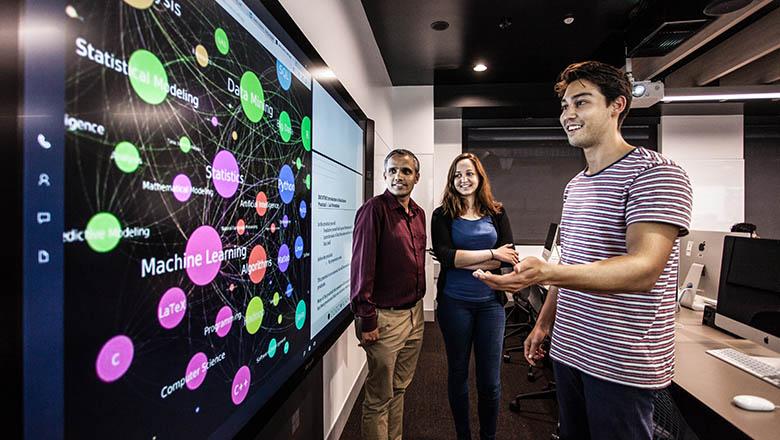Categories
University of Technology Sydney
No.23-16 Generalized Out-of-distribution Detection: Theory and Algorithm
Out-of-distribution (OOD) detection is vital for ensuring the safety and reliability of artificial intelligence systems. It represents a novel and trending area in machine learning an...
From University of Technology Sydney, Aug 23, 2023No.23-12 An Introduction to Sequential/Session-based Recommendation
In recent years, sequential/session-based recommendations have emerged as a new recommendation paradigm to well model users’ dynamic and short-term preferences for more accurate and t...
From University of Technology Sydney, May 17, 2023Advancing Machine Perception for Artificial Intelligence Systems
Artificial intelligence (AI) techniques have impacted on our lives profoundly, such as providing more secured and resilient social environments and assisting more accurate medical dia...
From University of Technology Sydney, Oct 05, 2022Texas A&M University
LibAUC: A deep learning library for X-risk Optimization
In this talk, I will present our recent research efforts of developing a deep learning library called LibAUC, which is applicable for solving a variety of compositional measures. I w...
From Texas A&M University, Oct 26, 2022RMIT University
A Non-Factoid Question-Answering Taxonomy
Non-factoid question answering (NFQA) is a challenging and under-researched task that requires constructing long-form answers, such as explanations or opinions, to open-ended non-fact...
From RMIT University, Nov 09, 2022University of Zurich
No.23-01 Escaping the Echo Chamber: The Quest for Normative News Recommender Systems
Recommender systems and social networks are often faulted to be the cause for creating Echo Chambers – environments where people mostly encounter news that match their previous choice...
From University of Zurich, Feb 22, 2023University of Sydney
No.23-02 Seven Algorithms for the Same Task (Testing Uniformity)
Suppose you get a set of (independent) data points in some discrete but huge domain {1,2,…,k}, and want to determine if this data is uniformly distributed. This is a basic and fundame...
From University of Sydney, Mar 08, 2023Australian National University
No.23-04 Multi-Domain Few-Shot Image Classification
Most existing few-shot classification methods only consider generalization on one dataset (i.e., single-domain), failing to transfer across various seen and unseen domains. In this ta...
From Australian National University, Mar 15, 2023No.23-03 Score based Diffusion Models and Their Applications
Generative models show great potential in generating new samples, which have been extensively investigated in 2D/3D vision tasks. Among them, the adversarial training based models, e....
From Australian National University, Mar 01, 2023Humboldt-Universität zu Berlin (HU)
No.23-0301 Efficient Distributed Complex Event Processing
Complex event processing emerged as a computational paradigm to detect patterns in event streams based on the continuous evaluation of event queries. Once such queries are evaluated i...
From Humboldt-Universität zu Berlin (HU), Mar 09, 2023Delft University of Technology
No.23-05 A magic ingredient, a secret spice, a special blend, for it can all be nice!' The Human Quotient for Better AI Systems
The unprecedented rise in the adoption of artificial intelligence techniques and automation in many contexts is concomitant with the shortcomings of such technology concerning robustn...
From Delft University of Technology, Mar 22, 2023Purdue University
No.23-09 Mobility Digital Twin for Connected and Automated Vehicles
A Digital Twin is a digital replica of a living or nonliving physical entity, and this emerging technology attracted extensive attention from different industries during the past deca...
From Purdue University, Apr 26, 2023Georgetown University
No.23-10 SEINE: SEgment-based Indexing for NEural Information Retrieval
Many early neural Information Retrieval (NeurIR) methods are re-rankers that rely on a traditional first-stage retriever due to expensive query time computations. Recently, representa...
From Georgetown University, May 03, 2023Weights & Biases
No.23-11 Building Experiment Tracking at Scale with Weights & Biases
Building experiments doesn’t just end once the model is deployed. Teams need to monitor their models in production and use their findings to iterate further. Especially when dealing w...
From Weights & Biases, May 10, 2023University of Washington
No.23-13 Task-aware Retrieval with Instructions
We study the problem of retrieval with instructions, where users of a retrieval system explicitly describe their intent along with their queries. We aim to develop a general-purpose t...
From University of Washington, Aug 02, 2023University of Wisconsin-Madison
No.23-15 How to Detect Out-of-Distribution Data in the Wild? Challenges, Research Progress and Path Forward
When deploying machine learning models in the open and non-stationary world, their reliability is often challenged by the presence of out-of-distribution (OOD) samples. Since data shi...
From University of Wisconsin-Madison, Aug 16, 2023DATA61-CSIRO
No.23-19 Graph Neural Networks for Large Dynamic Graphs
In real-world applications such as social networks, financial transactions, and recommender systems, graph-structured data is frequently dynamic, with the nodes and edges of the graph...
From DATA61-CSIRO, Sep 13, 2023University of Queensland
No.23-22 Process Mining: Opportunities and Challenges
In recent years, significant advances in extended reality (XR) and AI have offered novel, promising ways to visualise and eventually better understand large and complex data. Immersio...
From University of Queensland, Sep 13, 2023No.23-20 Immersive Data Visualisation and Interactive AI
In recent years, significant advances in extended reality (XR) and AI have offered novel, promising ways to visualise and eventually better understand large and complex data. Immersio...
From University of Queensland, Sep 13, 2023Introduction
Welcome to UQ Data Science Seminar Series!
This UQ Data Science seminar series aims to bring together students and senior researchers to discuss about their research, intending to have a diverse set of talks and speakers on to...
From Introduction, Jan 01, 2023Tsinghua University
No.24-01 Filter Bubble in Recommender System: Diversity and Beyond
Recommender system has reshaped how we access information in today’s world, make relevant content more accessible to everyone. However, it has also resulted in some negative side-effe...
From Tsinghua University, Mar 07, 2024Amazon
Leveraging semantics for recommendation at scale
In this talk, we present some of our recent work conducted at Amazon International Machine Learning Australia. First, we present a simple approach to address cold-start recommendation...
From Amazon, Mar 26, 2025No.24-02 Building AI/ML & Gen AI responsibly on AWS
This presentation explores best practices for building AI/ML and generative AI (Gen AI) models responsibly on AWS. We’ll explore real use cases where these technologies are driving va...
From Amazon, Mar 13, 2024Monash University
Towards Efficient Novel View Synthesis
Novel view synthesis (NVS) from 2D images aims to generate unseen views of a scene given multiple input observations. It is a fundamental task in computer vision that has garnered sig...
From Monash University, May 23, 2025No.24-03 Towards Open-World Object Segmentation and Detection
Segmentation and detection are two fundamental and classical tasks in computer vision. In recent years, significant attention has been devoted to the open-vocabulary object segmentati...
From Monash University, Apr 10, 2024University of Newcastle
No.24-04 Deep Copula-Based Survival Analysis for Dependent Censoring
Censoring is the central problem in survival analysis where either the time-to-event (for instance, death) or the time-to-censoring (such as loss of follow-up) is observed for each sa...
From University of Newcastle, Apr 24, 2024University of Glasgow
No.24-06 Generative Sequential Recommendation
In this talk, we first introduce the Sequential Recommendation problem and draw parallels between language modelling and recommender systems. To set the stage, we also briefly cover s...
From University of Glasgow, May 22, 2024Google Research India
No.24-05 Efficient and Elastic Large Models
Generative LLMs are transforming multiple industries and have proven to be robust for multitude of use cases across industries and settings. One of the key impediments to their widesp...
From Google Research India, May 17, 2024The University of New South Wales
No.24-07 Embracing Changes in Deep Learning: Continual Learning with Augmented and Modularized Memory
Deep learning (DL) has been successful in many applications. However, the conventional DL approaches focus on the end results on fixed datasets/scenarios and fail to handle the dynami...
From The University of New South Wales, Jun 11, 2024Michigan State University
No.24-08 Towards Graph Foundation Model
Graph Foundation Models (GFMs) is a single (neural) model that learns transferable graph representations that can generalize to any new, previously unseen graph. In this talk, we will...
From Michigan State University, Sep 11, 2024University of Hong Kong
No.24-11 Graph Foundation Model in the Era of LLMs
Graph data structures play a crucial role in real life, effectively illustrating the complex relationships and structural dependencies between entities. In recent years, the generaliz...
From University of Hong Kong, Oct 16, 2024University of Adelaide
No.24-09 Human-Computer Conversational Vision-and-Language Navigation
The dynamic realm of Vision-and-Language Navigation (VLN) has garnered significant multidisciplinary interest, resonating within the domains of computer vision, natural language proce...
From University of Adelaide, Oct 08, 2024Stanford University
No.24-10 Recreating the Physical Natural World from Images
Today, generative AI models excel at creating visual worlds through pixels, but still often struggle with the comprehension of basic physical concepts such as 3D shape, motion, materi...
From Stanford University, Oct 09, 2024Emory University
No.24-12 Graph Neural Networks in Epidemic Modeling: An In-Depth Review and Toolkit
Since the onset of the COVID-19 pandemic, there has been growing interest in epidemic modeling. While traditional mechanistic models effectively describe the mathematical dynamics of ...
From Emory University, Oct 30, 2024Cornell University
No.24-15 Evaluation and Reasoning in Real-world Scenarios
User queries in natural settings, such as “provide a design for a disk topology for a NAS built on TrueNAS Scale, as well as a dataset layout,” differ significantly from those produce...
From Cornell University, Nov 20, 2024No.24-13 Contextual Document Embeddings
Dense document embeddings are central to neural retrieval. The dominant paradigm is to train and construct embeddings by running encoders directly on individual documents. In this wor...
From Cornell University, Nov 06, 2024Pennsylvania State University
No.24-14 Long-Range Meets Scalability: Unveiling a Linear-Time Graph Neural Network for Recommendation at Scale
Recommender systems play a central role in shaping our daily digital experiences, yet achieving both scalability and expressive power remains a significant challenge. While Graph Neur...
From Pennsylvania State University, Nov 13, 2024MIT
No.24-16 Towards Graph Machine Learning in the Wild
Learning on graphs is a long-standing and fundamental challenge in machine learning and recent works have demonstrated solid progress in this area. However, most existing models tacit...
From MIT, Nov 27, 2024UniMelb
No.24-17 Mitigating Distribution Shifts in Using Pre-trained Vision-Language Models
Benefiting from large-scale image-text pair datasets, powerful pre-trained vision-language models (VLMs, such as CLIP) enable many real-world applications, e.g., zero-shot classificat...
From UniMelb, Dec 02, 2024Princeton
No.24-18 Developing Effective Long-Context Language Models
In this talk, I will share our journey behind developing an effective long-context language model. I’ll begin by introducing our initial approach of using parallel context encoding (C...
From Princeton, Dec 04, 2024Deepmind
No.24-19 When LLMs Meet Recommendations: Scalable Hybrid Approaches to Enhance User Experiences
While LLMs offer powerful reasoning and generalization capabilities for user understanding and long-term planning in recommendation systems, their latency and cost hinder direct appli...
From Deepmind, Dec 09, 2024Stanford
No.24-20 Controllable Visual Synthesis via Structural Representation
End-to-end neural approaches have revolutionized visual generation, producing stunning outputs from natural language prompts. However, precise controls remain challenging through dire...
From Stanford, Dec 13, 2024NUS
No.25-01 Show-o: One Single Transformer to Unify Multimodal Understanding and Generation
Exciting models have been developed in multimodal video understanding and generation, such as video LLM and video diffusion model. One emerging pathway to the ultimate intelligence is...
From NUS, Feb 27, 2025UC Merced
From Next Token Prediction to Compliant AI Assistants: A Systematic Path toward Trustworthy Large Language Models
Language models are systems that can predict upcoming words” - this classical definition of NLP models forms the basis of LLMs becoming responsive text completion models. However, suc...
From UC Merced, Feb 28, 2025Adobe
Towards Multimodal Intelligence: Bridging Vision, Language, and Large-Scale Models
Multimodal intelligence is revolutionizing document understanding by enabling AI to process and reason across vision and language. This talk explores how large-scale models integrate ...
From Adobe, Mar 07, 2025University of Maryland
Using Large Language Models for Cross-Language Information Access
One interesting aspect of today’s generative Large Language Models (LLMs) is that they are natural polyglots, facile in many languages. These new multi-dexterous capabilities offer ...
From University of Maryland, Mar 28, 2025Westlake University
AppAgent X—Making GUI Agents Smarter with Use
In recent years, the development of multimodal large language models has given rise to a new class of intelligent agents—GUI Agents—that can autonomously operate computers and smartph...
From Westlake University, Apr 02, 2025University of Illinois Urbana-Champaign
Towards Knowledgeable Foundation Models
Large language models (LLMs) and vision-language models (VLMs) have demonstrated remarkable performance on knowledge reasoning tasks, owing to their implicit knowledge derived from ex...
From University of Illinois Urbana-Champaign, Apr 10, 2025Singapore Management University (SMU)
Would prompt work for graph learning? An exploration of few-shot learning on graphs
Graph structures are prevalent across a variety of fields, including social networks, e-commerce, transportation, and biological systems. Within these graphs, numerous analytical and ...
From Singapore Management University (SMU), Apr 17, 2025University of California
Towards Large Generative Recommendation Models: A Tokenization Perspective
The emergence of large generative models is transforming the landscape of recommender systems, offering new opportunities through scaling laws and flexible content generation. One of ...
From University of California, San Diego (UCSD), May 22, 2025San Diego (UCSD)
Towards Large Generative Recommendation Models: A Tokenization Perspective
The emergence of large generative models is transforming the landscape of recommender systems, offering new opportunities through scaling laws and flexible content generation. One of ...
From University of California, San Diego (UCSD), May 22, 2025UC Berkeley
Reasoning with Language Models
Language models are primarily trained via imitation on massive amounts of human data; as a result, they’re capable of performing a wide range of tasks but often lack the deep reasonin...
From UC Berkeley, May 29, 2025NTU
Beyond Visual Geometry- Toward Physical 3D Reconstruction
Recent progress in 3D Visual Geometry has led to impressive reconstruction and generation results using purely feed-forward deep networks. However, much of this progress remains limit...
From NTU, Sep 26, 2025Teach AI What It Doesn't Know
The remarkable capabilities of machine learning (ML) models, especially foundation models like GPT, have transformed numerous domains. However, these systems often falter in real-worl...
From NTU, Jun 26, 2025UNSW
AI-Driven Solutions in Individualised Medicine- From Multimodal Omics Data to Disease Diagnosis and Biomarker Discovery
Despite significant advancements in medical science and an increasing emphasis on precision medicine, the majority of medical diagnoses are still made after patients exhibit noticeabl...
From UNSW, Jul 18, 2025LLM
No.26-01 Structured Representation Learning for Latent Thinking in LLMs
Despite the excellent performance of LLMs across various output-based benchmarks, we argue that focusing solely on outputs overlooks both underlying risks and untapped opportunities w...
From LLM, Feb 11, 2026





















































